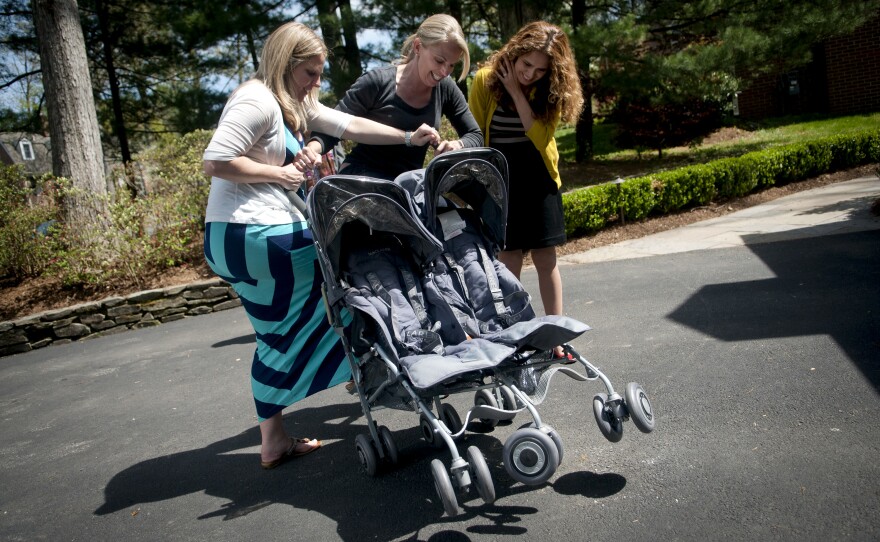The Sunday morning party in suburban Washington, D.C., had all the trappings of anticipation.
A lace-trimmed bassinet, a jumble of gifts tied with pink and blue ribbons, a "diaper cake" on the table. And chatter about babies, diets, new spring outfits and the coming end of the school year.
But for Sue Costello, the grandmother-in-waiting, the happy cacophony of the baby shower masked an abiding anxiety about the future of her daughter's family and the twins — a boy and a girl — who are due before June's end.
That future is now in the hands of the U.S. Supreme Court. This month, justices will decide a case that will determine whether gay couples such as Sue's daughter Kelly Costello and Fabiola Morales, who married in late 2012, will be able to stay together, in America.
"We are watching for that decision big time," Sue Costello says, "and we'll face it when it comes.
"But sometimes when things change," she says, "they change overnight."
No Way In
Morales, 39, is a native of Peru, in the U.S. on a student visa. Unlike heterosexual spouses in America, Kelly Costello, 31, is unable to sponsor her foreign-born wife for permanent residency status because the 1996 Defense of Marriage Act defines marriage as between a man and a woman.
That means same-sex marriages, including those performed in 12 states, and Washington, D.C., where they are legal, are not recognized under federal law, including U.S. immigration law.
Kelly Costello says she and Morales were well aware of the restrictions when they married, but said they were determined not to let a government set the course of their life together.
"We just wanted to do as any normal couple would do and get married," Costello says. "Not for any technical reason other than love."

Says Morales: "We have been waiting for things to change, like the laws. But we realize we cannot put our lives on hold."
They are among an estimated 36,000 binational, same-sex couples in the U.S., says Steve Ralls of Immigration Equality; nearly half of them have children. A recent effort by the advocacy group and others to include spousal sponsorship language in an immigration bill being considered by the .
That has made the Supreme Court decision all the more consequential, Ralls said.
Unless the high court strikes down DOMA, or the Senate reconsiders what to include in its immigration bill, Morales will have to leave the country when she finishes her master's in nursing program at Georgetown University. Or she could join the ranks of those in the U.S. illegally.
That's not something the couple wants. They've contemplated a move to either Peru, where Morales has family, but also would not recognize their marriage, or to a country like Canada, where their marriage would be legal under federal law.
But relocation is not something that the almost relentlessly positive couple dwells on.
"We always say that everything happens for a reason," says Costello, who teaches English as a second language to elementary school children in a suburban Washington school district. "That's kind of our motto."
Their Story
The women joke that when they met in Washington at a mutual friend's party seven years ago it was love at first sight.
"These have been the happiest years of my life," Morales said in the sun room of Kelly's parents' home, where they have been living.
Morales was working in Miami when they met, employed as a bank IT project manager and in the country on a work visa. She moved to Washington to be with Costello, obtaining a student visa that allowed her to get an undergraduate degree in nursing from Georgetown, and pursue her master's degree.
"She's my best friend, she's the love of my life," Morales says of Costello. "We knew that we were going to be together forever — always together, we could do anything, and guided by God."
The women say they are sustained in times of vulnerability, including Morales' struggle with multiple sclerosis, by family and their strong Catholic faith. They attend Mass weekly at a nearby church, and a priest gave a blessing at their wedding.
They wear matching gold St. Christopher medals on necklaces, and pray together daily.
"We understand that the Catholic Church maybe still has to change a little bit more to love everybody, like people like us," Morales says. "But we have found support from the Catholic Church. Not everybody is against gay people."
Costello, who says she has become more devout since meeting Morales, adds: "As my Dad always says, we are all God's children."
The families of both women have embraced the couple, including Kelly's 83-year-old aunt, Deirdre Krouse.

"You'd think Fab was a terrorist or something," Krouse said at the baby shower. "She's a wonderful girl. She just wants to become an American citizen."
The couple imagine what their life might be a year from now, if the court strikes down DOMA.
"We would love to have a home of our own in the area," Costello says. "I'd be able to sponsor Fab, and she would be working as a nurse or a nurse practitioner, feeling secure and stable."
Says Morales: "Real happiness. Complete."
Sue Costello says that the family will deal with whatever the future brings, but are holding on to the hope that historic changes in the way people view gay couples will be reflected in the court's decision.
"More and more people are coming to understand the fact that it's not an abnormal thing," she said, noting what she sees as an inherent unfairness: another of her daughters is also married to someone who is not from the U.S. and simply got a marriage visa that allowed him to stay.
"It's not the same for Kelly and Fab," Sue Costello said of a situation her daughter says is tantamount to forcing citizens to choose between their spouse and their country.
Copyright 2020 NPR. To see more, visit https://www.npr.org. 9(MDAxNDQ2NDAxMDEyNzU2NzM2ODA3ZGI1ZA001))























